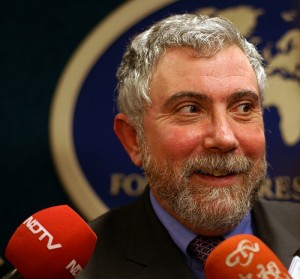Influential liberal columnist (and Nobel economics laureate) Paul Krugman struck back today in his New York Times blog against critics of the Waxman-Markey bill who view cap-and-trade as an open invitation to massive new depredations by Wall Street. Michael Hoexter, Ph.D., a blogger and consultant on policy, energy efficiency and green marketing to businesses and government, and a previous contributor to this page, sent this reply, which we reprint, with Michael’s permission, in full. (The selections of bolded passages are ours. — Editors.)
Prof. Krugman —
I agree with you on many issues and also learn things from you as well. But sometimes you make purely political decisions that you vest with economic authority but not very careful thinking.
 I think this post is an instance of economics being shaped by politics rather than being the (maybe) science that it attempts to be. I am personally full-time committed to action on climate change but you seem to be simply throwing your prestige behind an instrument that I believe is flawed, and not only because of an inchoate fear of speculation.
I think this post is an instance of economics being shaped by politics rather than being the (maybe) science that it attempts to be. I am personally full-time committed to action on climate change but you seem to be simply throwing your prestige behind an instrument that I believe is flawed, and not only because of an inchoate fear of speculation.
Let’s say we invented a market mechanism that made “health” a tradable commodity. Would you support that? For some reason cap and trade has gotten a pass from so-called progressives for too long.
Here are some problems:
- Your analogy to wheat and other markets is flawed because these are pre-existing markets that unite multiple sources of supply with multiple sources of demand. A permit market has just one source for permits: the government. Inventing a market to distribute those permits is a needless layer of complexity. The fact that it is a planfully constructed market makes it a different species as well.
- Martin Weitzman, the MIT economics professor who in 1974 speculated (intellectually) that in certain circumstances one might be able to regulate quantities of emissions rather than tax them or regulate them directly, has said that taxation is better than quantity regulation in the case of carbon. He would recommend quantity regulations only where a particular precise amount of something needs to be achieved … taxation seems better if you want to go in one direction to zero.
- Price volatility and arbitrage are the inevitable result of markets. Wall Street and others like carbon markets because of the (needless) complexity of carbon trading and the potential to exploit information asymmetries. On the other hand, to reduce carbon emissions we need a lot of long-term investments that on the whole do not benefit from financial market fluctuations. Now try to calculate the NPV [net present value] of an investment with a volatile carbon price … that’s going to be difficult. Far easier if you know what the carbon tax rate will be within the next 5 or 10 years. Yes, there are mechanisms to dampen volatility and regulate the markets but these add still more complexity and sinecures for officials and representatives of market actors. It’s like buying a Cadillac and ripping off the badge, scratching the paint and deflating the tires … why invent the market in the first place?
- The regulators and actors on these carbon markets are inessential to cutting carbon emissions and will represent an interest group that will dampen and interfere with more serious efforts to cut emissions. All you need to cut emissions is a predictable price on carbon, positive government programs for infrastructure build-out, and/or “command and control” regulations that ban certain activities.
- Cap and trade is the unfortunate offspring of an era of tax phobia which is fast drawing to a close. We are going to have to raise taxes, including Pigovian ones. Why not a carbon tax? Much more transparent and along with direct regulation a much faster route to the goal.
For some reason, there is a blind spot with regard to cap and trade among so-called progressives … you seem to have fallen prey to it.
Photo: Flickr / daniel.gene

David Collins says
The most telling point appears to be the first clause of #5: “Cap and trade is the unfortunate offspring of an era of tax phobia…” but unfortunately, although said era should be drawing to a close, it is not doing so fast enough. This is why we have not Cap’n Trade but the Waxman-Markey immitation thereof, which goes through Clintonesque gymnastics: “That depends on your definition of what ‘tax’ is…”
James Handley says
Bravo! To make the climb to a low-carbon economy, a clear carbon pricing policy essential. Skip the extra baggage: complexity, “hide the price” games and “middle men” on Wall St? (Cap-and-trade.) With unemployment approaching 10%, cutting payroll taxes to stimulate employment should top President Obama and Congress’s agenda. Combining carbon pricing policy with more take-home pay for every worker in the United States (as Rep. Larson proposes) is a huge “win-win.” Time for advocates of direct carbon pricing to link arms with the labor movement?
Jesse says
The wealthy will pay more….Ooooo that completley takes my mind off of a fascist government taking my money for invisible molecules that they create and that cause a ” global crisis” that is immpossible to prove. Whatever happened to your innocent until proven guilty?? Give us some proof before robbing us!! You can only push people so far.